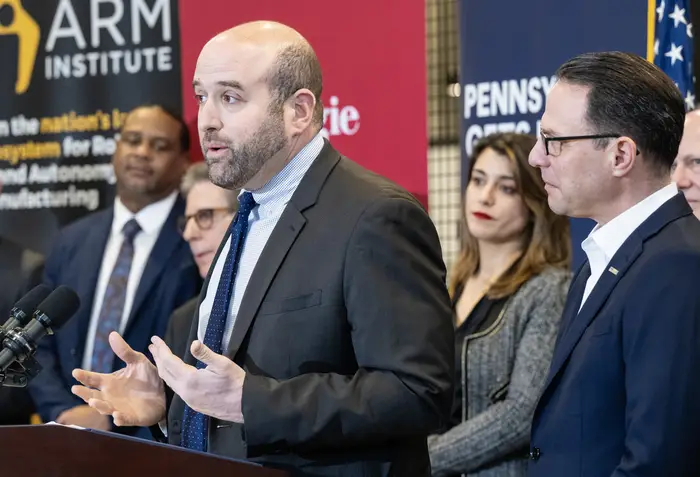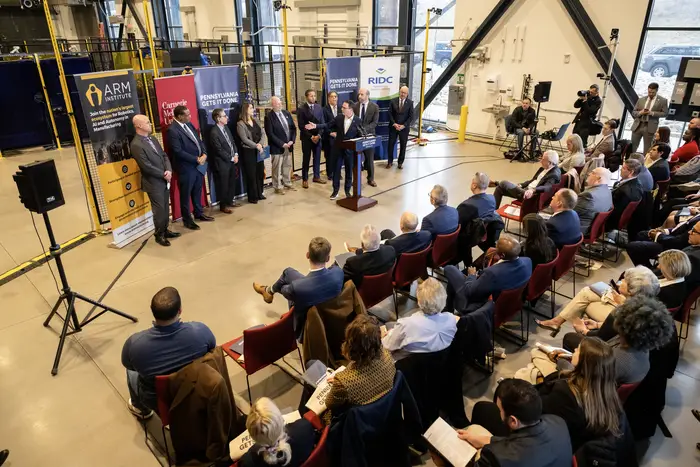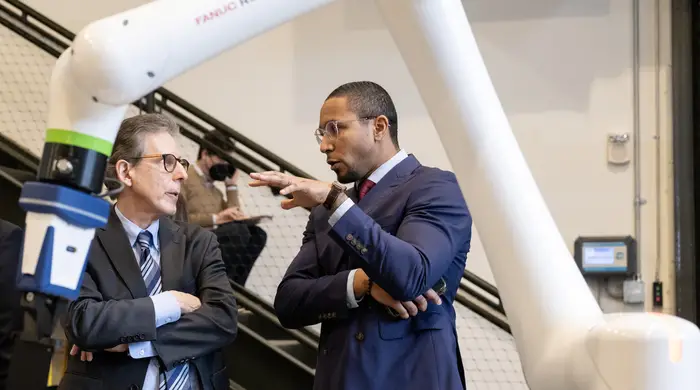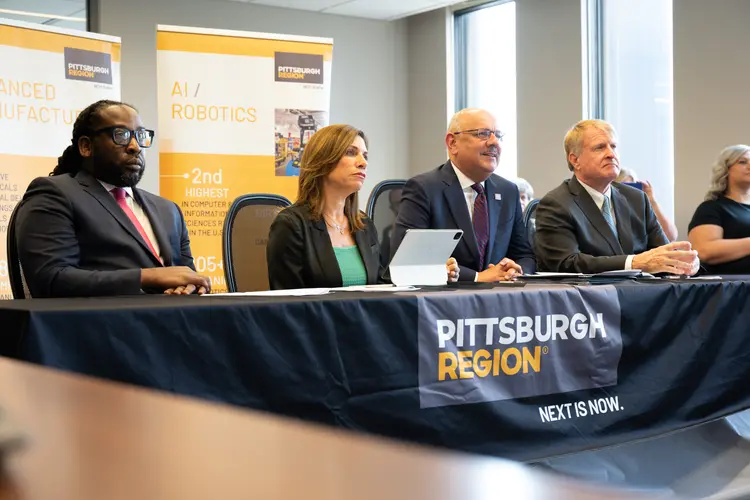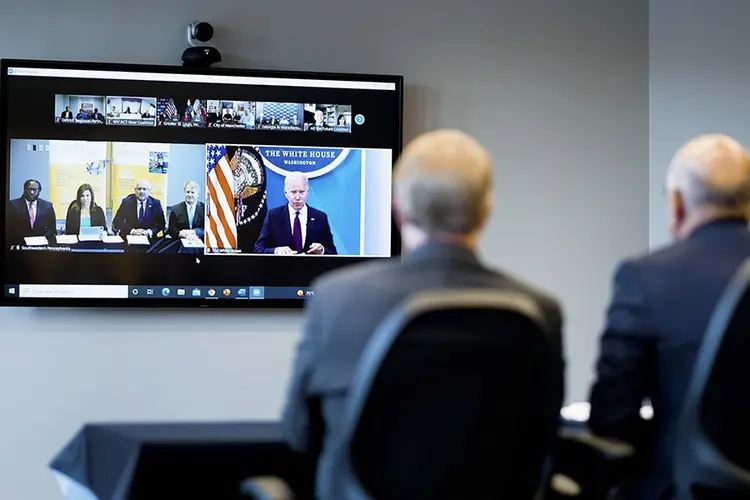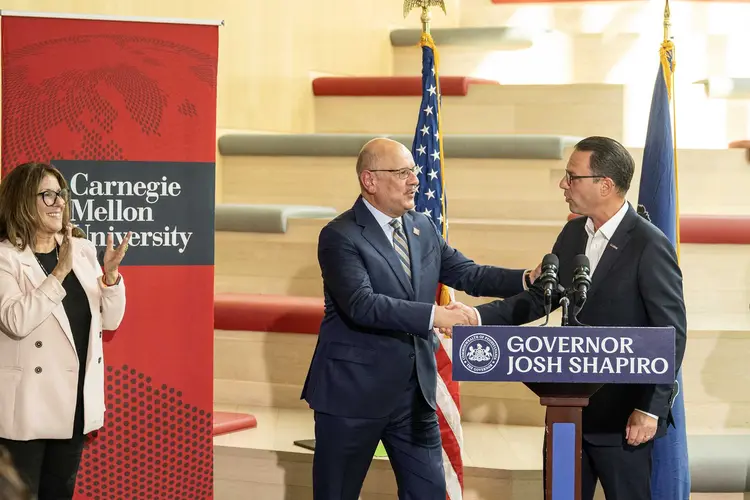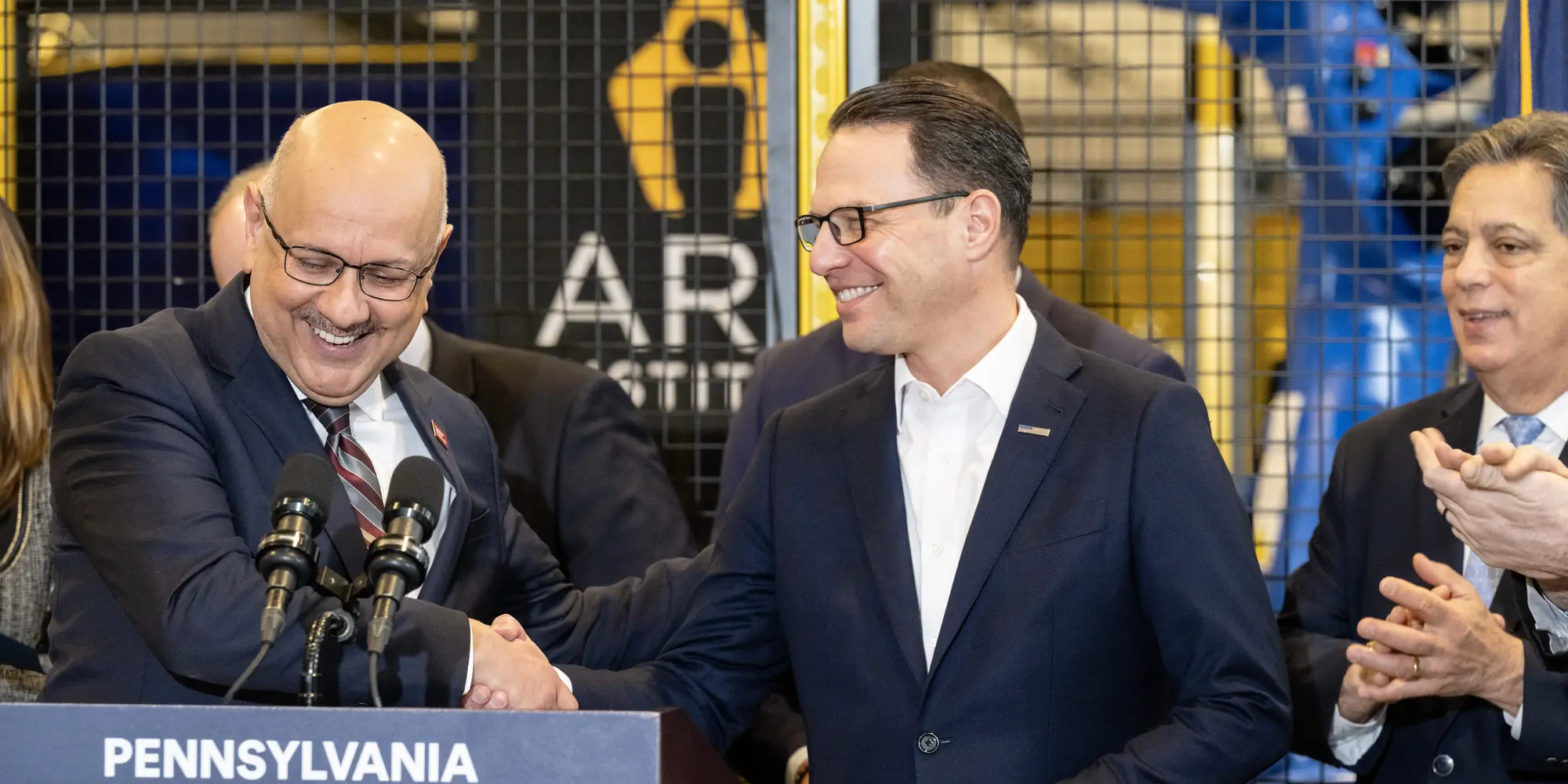
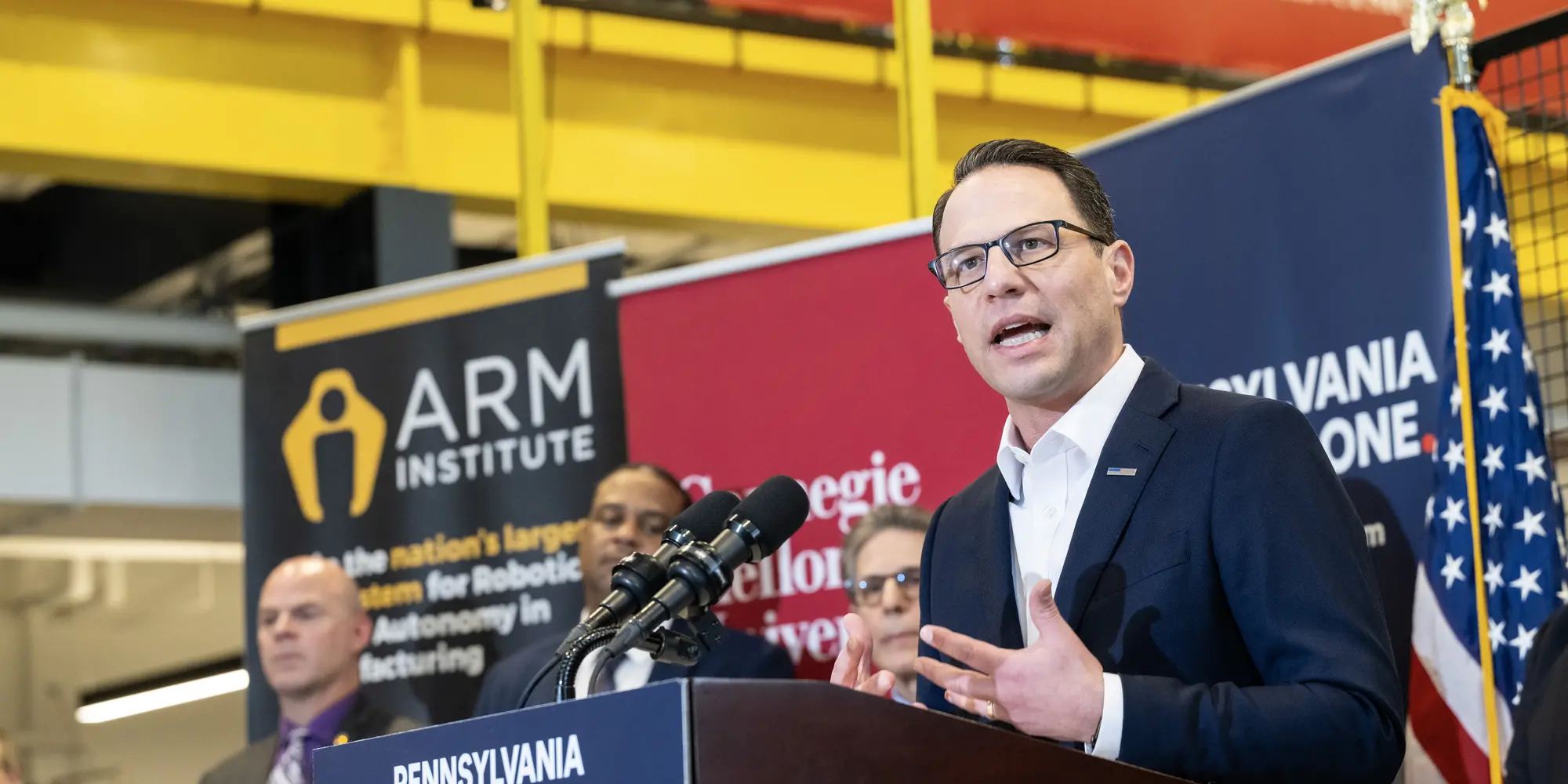
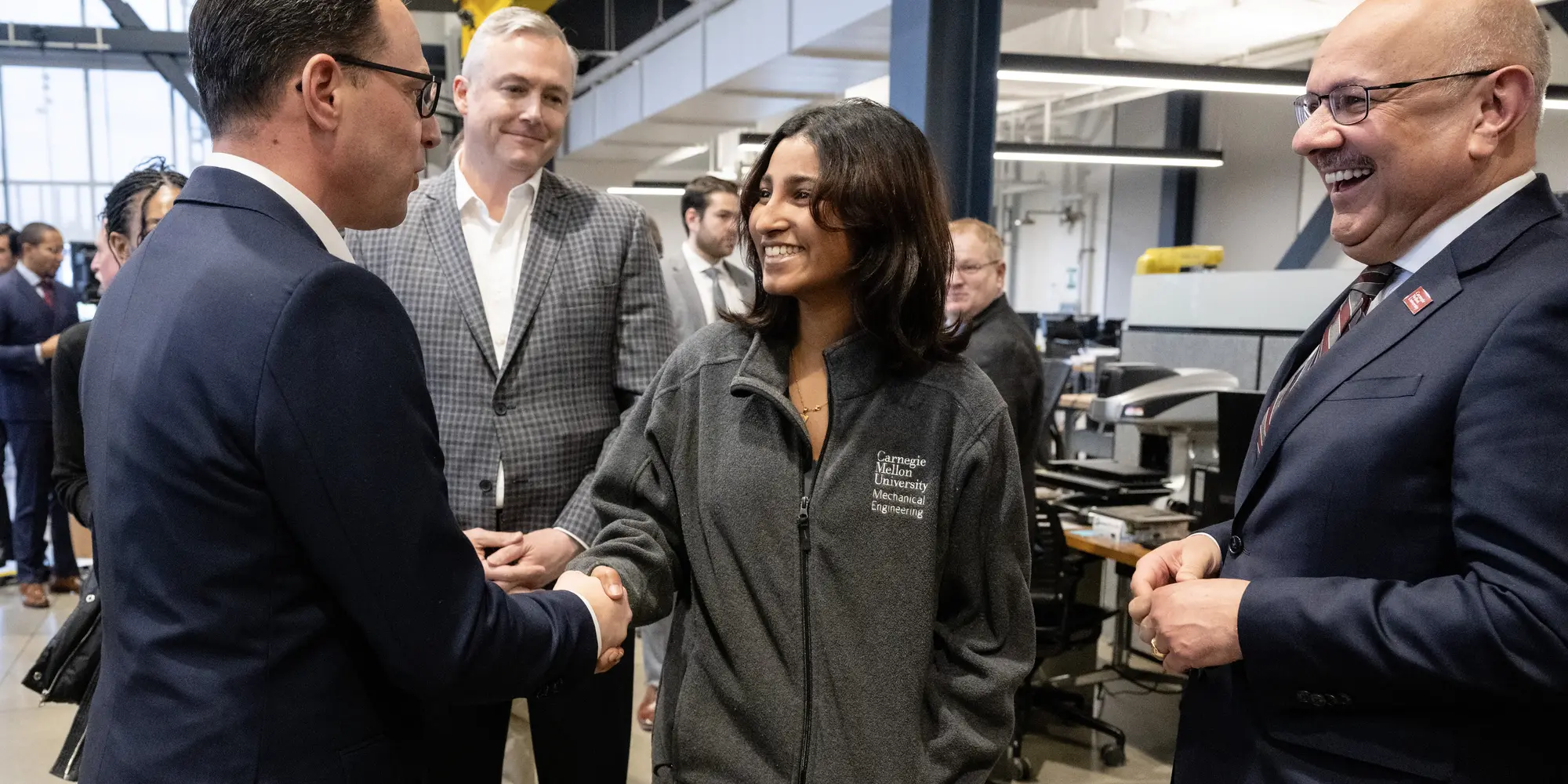
With Mill 19 Visit, Pa. Gov. Shapiro Details 10-year Economic Development Plan
Media Inquiries
Steps away from the Carnegie Mellon University robotics and advanced manufacturing research taking place at Mill 19(opens in new window), Pennsylvania Gov. Josh Shapiro highlighted the need for innovation, collaboration and investment across the state.
“This is the kind of work that’s going to play a big part in our commonwealth’s new economic development strategy(opens in new window) and why, specifically, I wanted to be right here today to talk about it,” he said Wednesday.
Shapiro shared details of the new 10-year plan, which his office called the first comprehensive plan of its kind to guide the commonwealth’s economic growth in almost 20 years.
The governor was joined by several regional and state officials including Rick Siger(opens in new window), secretary of the state’s Department of Community and Economic Development, who previously served as chief of staff and senior adviser to CMU President Farnam Jahanian(opens in new window).
Siger called Mill 19 an “outstanding example” of collaboration based on a joint vision of priorities in advanced manufacturing and robotics that can lead the way to sustainable economic growth.
“This facility and really this whole site, Hazelwood Green, exemplifies what it means to identify what a region does best, boldly invest in it, establish a real economic driver that’s set up for the economy of today and tomorrow, all while focusing on the needs of surrounding communities,” he said.
Jahanian connected the history of the former steel-making site to the research and economic development that comes from a place such as Mill 19.
“While the products that are created here may be different from a century ago, the elements that make Pittsburgh and Pennsylvania exceptional remain the same. It’s about innovation, it’s about our community, it’s about partnership,” he said. “In fact, the same spirit of collaboration that made Hazelwood Green possible — including public, private and labor partners working together — is at the heart of the governor’s plan.”
The plan’s five goals(opens in new window) are to invest in economic growth to compete, make government work at the speed of business, increase pathways to the workforce that enable Pennsylvanians to secure family-sustaining jobs, innovate to win, and build vibrant and resilient regions across the state. Each goal is addressed through specific, dedicated initiatives within the new strategy.
“The plan charts an ambitious course for the state’s economic growth over the next 10 years, and it has arrived right on time,” Jahanian said. “This is a once-in-a-generation moment of opportunity for Pennsylvania, and, candidly, for the entire nation.”
Based on data-driven analysis and potential for growth, the governor’s plan focuses on five key industries: agriculture, energy, life sciences, manufacturing, and robotics and technology.
“We have to invest,” Shapiro said. “We have to make sure that we’ve got the tools and the resources to do that.”
I’m in Pittsburgh at @CarnegieMellon’s Advanced Robotics for Manufacturing Institute to highlight Pennsylvania's new economic development strategy — our Commonwealth's first in decades.
Tune in to see how Pennsylvania Gets It Done: https://t.co/rIKxJOSGUw— Governor Josh Shapiro (@GovernorShapiro) January 31, 2024
Pennsylvania, with its proximity to several major U.S. markets and relatively low cost of doing business, is home to more than 23 Fortune 500 companies and more than 1 million small businesses, according to a news release(opens in new window).
About 190,000 skilled graduates from the state’s colleges and universities, including those from Carnegie Mellon, are added to Pennsylvania’s diverse and talented workforce each year.
The plan includes convening a Higher Education Innovation Council to bring together leaders from across the state to assist entrepreneurs in taking their innovations to market, attract and retain talent, and integrate emerging technology into regional innovation ecosystems.
Shapiro emphasized the need to invest in higher education at a state level.
“Our failure to invest in higher education over years has closed the doors of opportunity for too many Pennsylvanians,” he said. “It’s on us to open that up.”
Whether a high school student wants to take an apprenticeship and learn a trade or get a degree at a university, the opportunity should be available and affordable, Shapiro said.
“Both of those paths deserve respect, and both deserve our dedication, our commitment and our resources,” he said. “Higher ed is critical for access, for innovation and for opportunity.”
In January 2023, Shapiro visited Carnegie Mellon to sign an executive order establishing the Pennsylvania Office of Transformation and Opportunity.
The newly established statewide office combines business leaders, innovators, local communities and state agencies to encourage economic growth and Pennsylvania’s competitiveness.
“They’ve been aggressively helping small, diverse businesses get certified so they can win state contracts, along with working with huge developers on overcoming permitting and licensing delays, making sure we can get stuff done,” Shapiro said.
The governor, who previously visited Carnegie Mellon in September to sign an executive order on generative AI, said his new strategy includes targeted innovation funds to work with startups, entrepreneurs and technology development across industries.
“From the Strip District to our farmlands, we’ve got opportunities for innovation in technology to take hold, but we’ve not connected the dots between the two,” he said. “Our higher education institutions are critical for that and so is our investment.”
Jahanian, who served on the governor’s transition team, wrote in an op-ed in the Pittsburgh Post-Gazette(opens in new window) that the plan relies on higher education to strengthen and streamline how graduates will become in-demand talent for the industries where they will land.
“I find Gov. Shapiro’s plan to be ambitious, inspiring and incredibly timely,” Jahanian wrote. “This strategy expects our institutions to work together to better address industry needs and better leverage regional opportunities.”
Speakers at Wednesday’s event also included Pittsburgh Mayor Ed Gainey; Allegheny County Executive Sara Innamorato; Don Smith, president of the Regional Industrial Development Corporation; Darrin Kelly, president of the AFL-CIO’s Allegheny/Fayette Central Labor Council; State Senator Jay Costa (D-43); State Rep. Aerion Abney (D-19); Stefani Pashman, CEO of the Allegheny Conference on Community Development; and Ira Moskowitz, CEO of the Advanced Robotics for Manufacturing Institute.
On Feb. 6, Shapiro will hold his annual budget address calling for significant investments all directly tied to this 10-year strategy including programs to support workforce training, agriculture and startup innovation, commercial corridors and growth incentives.
“Pennsylvania has all the necessary, tough-to-come-by ingredients to shape the future, to strengthen our economy and to secure our place as the nation’s leading economic engine,” Jahanian said.
CMU President Farnam Jahanian writes in a new op-ed that @GovernorShapiro's statewide economic development strategy charts a new course for Pennsylvania's future.
The plan looks to academia to cultivate talent and integrate emerging technologies.https://t.co/mgrV3d5DUv— Carnegie Mellon University (@CarnegieMellon) January 31, 2024
